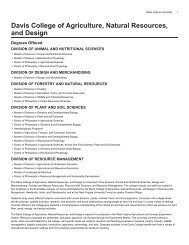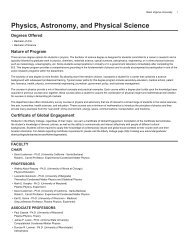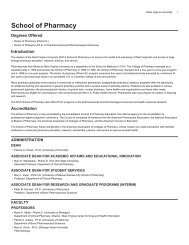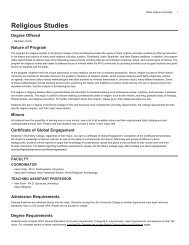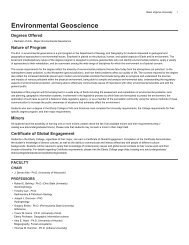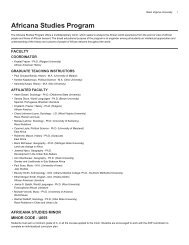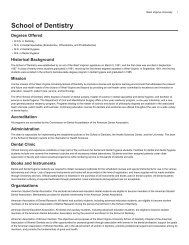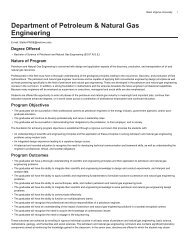Download PDF of this page - West Virginia University
Download PDF of this page - West Virginia University
Download PDF of this page - West Virginia University
You also want an ePaper? Increase the reach of your titles
YUMPU automatically turns print PDFs into web optimized ePapers that Google loves.
4 Health Policy, Management and LeadershipHPML 624. Policy Tools for Popltn Health. 3 Hours.Students advance their pr<strong>of</strong>iciency and ability to understand the policy system and work successfully within it to develop and advance evidence-basedpolicy alternatives in order to improve population health.HPML 626. Internship. 1-6 Hours.(May be repeated for a maximum <strong>of</strong> 6 credit hours.) The internship provides students the opportunity to develop their practical skills and enhancepr<strong>of</strong>essional competencies by applying the knowledge and techniques gained from their MPH coursework to public health practice.HPML 629. Capstone. 3 Hours.PR: PUBH 622. A required course for HPML students, <strong>this</strong> course is to be taken in the last semester <strong>of</strong> study. Students are required to demonstrate theability to synthesize and integrate knowledge and competencies across the full breadth <strong>of</strong> the MPH-HPML curriculum.HPML 660. Methods-Hlth Services Rsrch 1. 3 Hours.PR: BIOS 601 and HPML 622. Students acquire pr<strong>of</strong>iciency in health services research methodologies used to assess how health care services areorganized, financed, assessed and delivered, and how these arrangements affect health care quality and outcomes, and population health.HPML 661. HSR Informatics. 3 Hours.This course provides students with the applied practical understanding <strong>of</strong> and skills needed to access and use health care information systems used inperforming health services research analysis.HPML 670. Policy Analysis-Popltn Hlth 1. 3 Hours.PR: BIOS 601 and HPML 601 and HPML 622 and HPML 671. This course provides students an intermediate understanding <strong>of</strong> policy analysisapproaches during the formation, implementation, and outcome stages <strong>of</strong> a policy’s lifespan. A wide variety <strong>of</strong> healthcare and public health policies willbe analyzed.HPML 671. Popltn Hlth Plcy Anlyss Info 1. 3 Hours.PR: BIOS 601 and HPML 601 and HPML 622 and HPML 670. This course provides students with the applied practical understanding <strong>of</strong> and skillsneeded to access and use public health and policy information systems used in performing health policy analysis.HPML 675. Hlthcr/Insr Pol:Mdcd/Mdcr/AfCr. 3 Hours.Students will attain a thorough understanding <strong>of</strong> Medicaid, Medicare, and other healthcare delivery systems in the United States, with special attentionpaid to issues <strong>of</strong> Federalism, financing, and the political nature <strong>of</strong> health insurance delivery systems. The massive Patient Protection and AffordableCare Act legislation and its effect on the healthcare system in the United States will also be examined.HPML 680. Perfrmnc/Econ Evalutn-Pub Hlth. 3 Hours.This course presents methods to demonstrate the business merit and worth <strong>of</strong> public health programs and policies. These commonly used techniquesinclude measuring business performance, developing business case arguments, and performing economic evaluations.HPML 691A-Z. Advanced Topics. 1-6 Hours.PR: Consent. Investigation in advanced topics that are not covered in regularly scheduled courses.HPML 695. Independent Study. 1-6 Hours.Faculty-supervised study <strong>of</strong> topics not available through regular course <strong>of</strong>ferings.HPML 696. Graduate Seminar. 1 Hour.PR: Consent. Each graduate student will present at least one seminar to the assembled faculty and graduate student body <strong>of</strong> his or her program.





